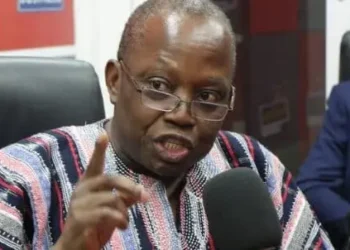As Tunisia’s political climate grows more oppressive, the country’s youth have begun taking to the streets, voicing their frustration ahead of the presidential election scheduled for October 6.
Among them is May Abidi, who joined the first rally organized by the Tunisian Network for the Defense of Rights and Freedoms. This newly formed coalition of civil society groups and political parties is raising concerns over the creeping authoritarianism under President Kais Saied.
The demonstration, which took place in the capital, Tunis, became the largest public protest in years. Thousands of mainly young Tunisians gathered to demand a return to democracy, which they believe has been eroded under Saied’s leadership. “We all came to demand an electoral feast of democracy like we had in 2019,” Abidi expressed during the rally.
Back in 2019, Tunisians sought change after nine successive cabinets failed to address the country’s economic challenges, including high unemployment and rampant corruption.
Saied, a former law professor and independent political candidate, won the presidential election with 72% of the vote, promising to root out corruption and provide a better future for the nation’s youth.
However, five years into his presidency, disillusionment has taken root among the younger generation. “Most of the young people who voted for Kais Saied in 2019 are extremely disappointed by now,” said Abidi. “They elected a man who said that he believed in the youth, but he ultimately puts the youth in prison.”
Youth Disillusionment Grows Amid Economic Decline
In 2021, two years after Saied’s election, the president began consolidating his power. By dismantling key democratic institutions and jailing political opponents, journalists, and lawyers, his rule has become increasingly authoritarian. Human rights organizations have sharply criticized Saied’s actions, accusing him of using these measures to secure a second term in office.

Tunisia’s electoral authority has approved just two candidates to run against Saied in the upcoming election, following the exclusion or detention of 14 others. One of these confirmed challengers, 43-year-old Ayachi Zammel, head of the opposition Azimoun party, has faced a 20-month prison sentence for allegedly forging voter endorsements.
His lawyer, however, claims the charges are unfounded and insists that Zammel will remain a candidate for the presidency. “Nothing can put an end to his candidacy apart from death,” the lawyer said.
Tunisia’s largest opposition party, Ennahda, has also come under fire. The party announced last week that over 90 of its members have been arrested. Ennahda condemned the crackdown, calling it “an unprecedented campaign of raids and violations of the most basic rights guaranteed by law.”
Amid this politically tense atmosphere, the country’s economic woes continue to mount. With a youth unemployment rate hovering at 39%, many young Tunisians are losing hope for a future in their homeland.
Political activist Wassim Hamadi, speaking at the protest in Tunis, noted that young people are increasingly looking for a way out. “The situation is deteriorating sharply. It is dominated by fear and intimidation,” Hamadi stated.
Tunisia has long been a popular departure point for migrants seeking passage to Europe. While most aspiring migrants come from sub-Saharan Africa, an increasing number of Tunisians themselves are risking the dangerous journey across the Mediterranean to Italy’s Lampedusa island.
According to a recent UN refugee agency report, Tunisians accounted for 13% of all arrivals in Italy between January and July 2024, up from 8% during the same period in 2023.
A controversial deal between Tunisia and the European Union has contributed to a significant 66% reduction in overall migrant arrivals this year compared to 2023. Nevertheless, the latest survey from Arab Barometer, a leading research network, indicates that nearly half of the Tunisian population is considering leaving the country.
The study, conducted in August, showed that 46% of those surveyed are contemplating migration — the highest percentage ever recorded.
As Tunisia heads toward its October election, the country’s youth, disillusioned by broken promises and worsening conditions, seem to be turning to protests and migration as their last resort.
READ ALSO: DRIP Investigation Reveals Concerns


















